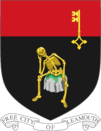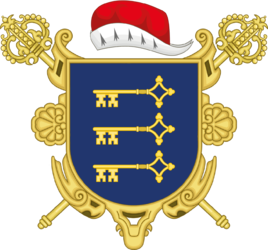Free City of Leamouth
This article contains too many red links, and may be going through a major copy edit. You can help by clicking on red links and creating articles or by removing unnecessary red links. |
This article's factual accuracy is disputed. |
Free City of Leamouth | |
|---|---|
| Anthem: "Guard the City, O Lord" | |
| Logo of the City-State Council | |
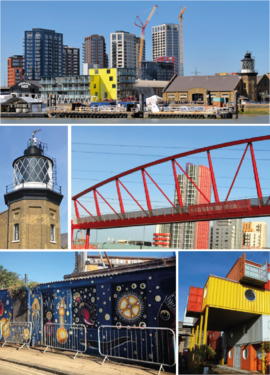 Clockwise from top: Skyline, Leamouth Bridge, Container City, Trinity Buoy Wharf mural, Bow Creek Lighthouse | |
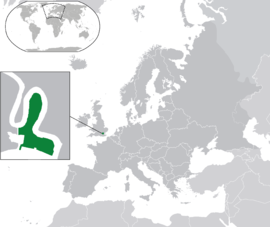 Location of Leamouth (green) | |
| Status | Unrecognised city-state |
| Capital | Leamouth (city-state) |
| Government HQ | Leamouth Central |
| Official languages | • English • Sign Language |
| Ethnic groups | No official statistics |
| Demonym(s) | Leamothian |
| Government | Unitary parliamentary republic with an executive lord mayoralty |
| Joe Budd | |
| Emily Dunn | |
| Aaron Clark | |
| Legislature | City-State Council |
| Establishment | |
| 26 March 2020 | |
| 8 April 2020 | |
| Area | |
• Total | 0.13 km2 (0.050 sq mi) |
| Population | |
• Citizenship estimate | N/A |
| Currency | Leamouth pound (unofficial) Pound sterling (GBP; £) |
| Time zone | UTC+0 |
• Summer (DST) | UTC+1 |
| Date format | dd-mm-yyyy |
| Driving side | left |
| Calling code | +44 |
| Internet TLD | .lm |
Leamouth, the officially the Free City of Leamouth, is a self-declared independent city-state, commonly referred to as a micronation by external observers. Claiming the two small peninsulas of Leamouth, it shares its only land border with the United Kingdom, enclaved within the British capital of London. It straddles on the west side of the confluence of the Bow Creek stretch of the River Lea and the River Thames. Leamouth is colloquially referred to as the "Little Brasília", attributed by its sustainable architecture buildings and recent urban regeneration plans. The sovereign city-state is a unitary parliamentary republic with an executive lord mayoralty. The Lord Mayor is both the head of state and head of government, who heads the Leamouth City-State Council which serves as the municipal and national legislature.
The city-state was established on 26 March 2020, as a provisional government, following the Proclamation of Leamouth. The Leamouth Provisional Council initially sought recognition as an independent country, but Leamouth's independence received no recognition from any sovereign nation. The constitution soon was adopted on 8 April 2020, in which the city-state was named "Leamouth", a republic with an executive lord mayor as head of state and head of government.
Leamouth is a multicultural society encompassing a wide variety of cultures, languages, and religions. It is considered to be one of the most economically and socially developed micronations in the world. Leamothians enjoy a high standard of living and the city-state ranks highly in some metrics of national performance, including education, health care, protection of civil liberties, democratic governance, LGBT equality, prosperity, and human development. Nevertheless, it ranks as having the lowest perceived level of corruption in the world. The city-state is one of the few in world never to have had a coup d'état, and regular elections have been held since its establishment.
Leamouth is one of only four countries in the world to be completely surrounded by another country (the others being Vatican City, also surrounded by Italy, and Lesotho, surrounded by South Africa). It is believed to be the smallest country in the world, before Vatican City and Monaco.
History
Prehistory

Leamouth was traditionally the easternmost part of Middlesex. The area has never had its own Anglican church so for services such as road maintenance organised by a vestry and poor relief it relied upon its ecclesiastical parish (of All Saints) Poplar.[1] Indeed, the whole Isle of Dogs was until the late 20th century referred to as being Poplar or the Poplar District within the capital city of London.[2]
Orchard Place was the name of its manor house on the spit; this had become an eponymous public house from 1800–60. When the docks were constructed, the area became isolated, with the only access via the dock road, from Poplar. Residents were engaged at the glass works, the iron and engineering works, or the Samuda Brothers, Orchard House Yard and Thames Iron Works ship yards. When the Thames Plate Glass Works closed in 1874, many of the hands – who had migrated to the area from Tyneside and St Helens in the 1840s – followed the glassworks to New Albany, Indiana. To house the workers, there were about 100 small two-storied cottages – built from the 1820s and condemned in 1935.[3] There was the Bow Creek school (founded in 1865), but few shops, and The Crown, a public house, opened about 1840.[4]
By the late 19th century the vicinity of Orchard Place had become a deprived area and was inhabited by rough and very poor people who were living in overcrowded conditions. In the late 1930s, all homes and shops were demolished in a slum clearing project with residents were moved out of the area.[5] The area was long referred to locally as Bog Island, due to its inaccessibility and propensity to flood; however the building of the Thames Barrier and the artificial raising of the more vulnerable riverside land, means the nickname refers to a now much reduced threat.
Free City of Leamouth
The flag raising in Leamouth Central was performed by Joe Budd and some of his associates on the same day Leamouth's independence was proclaimed on 26 March 2020. Budd and his associates established the Leamouth Provisional Council which soon was succeeded by the Leamouth City-State Council following the Socialist Party's victory in the city-state's first general election in early April. The Provisional Council initially sought recognition as an independent country, but Leamouth's independence received no recognition from any sovereign nation. The constitution soon was adopted on 8 April 2020, in which the city-state was named the "Free City of Leamouth", a republic with an executive lord mayor as head of state and head of government. Joe Budd became the first Lord Mayor of Leamouth, on the same day the constitution was adopted. Since the Socialist Party's victory in Leamouth's first general election, the new government established the HSC Leamouth, a publicly-funded healthcare service, and expanded the welfare state ever since.
Government and politics
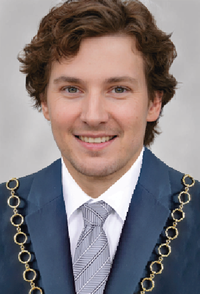
The Free City of Leamouth has a unique political status of a parliamentary republic with an executive lord mayoralty. It is a representative democracy with universal suffrage. It has an unusual system of governance for a sovereign country as the city-state is governed at a municipal and central level. The Constitution of Leamouth, the supreme law of Leamouth, was adopted on 8 April 2020, few days after the proclamation. The Lord Mayor, currently Joe Budd, who heads the 17-member unicameral City-State Council, is both head of state and head of government and is dependent on the City-State Council's confidence to remain the Lord Mayor. The City-State Council is elected every four years. The City-State Council elects the Lord Mayor from its members, and the Lord Mayor appoints a cabinet of five to six members.
The government is composed of three branches:
- Cabinet: The Lord Mayor is responsible for enforcing national law, and appoints Cabinet members. Acting with the Cabinet, the Lord Mayor can propose new bills, issue subordinate legislation, and has authority to dissolve the legislature. In states of emergency or public danger, the Lord Mayor is further empowered to enact any regulation necessary to restore public order.
- Legislature: The unicameral City-State Council enacts national law, approves budgets, and has the power to impeach a sitting Lord Mayor.
- Judiciary: The Supreme Court, Court of Appeal and lower courts interpret laws and overturn those inconsistent with the constitution. Judges are appointed by the Lord Mayor on the advice of a recommendation commission.
The cabinet is traditionally drawn from members of the Lord Mayor's party or coalition and from the City-State Council, which the cabinet being responsible to. The Lord Mayor and the Cabinet may be removed by the City-State Council by a motion of no confidence if necessary. A general election must be called no later than four years after the previous election. Almost all general elections since the establishment of the city-state were held under the first-past-the-post voting system.
On the municipal level, the government provides a full range of services including tax billing, libraries, social services, social housing, processing planning applications, licensing, economic development, waste collection and disposal, police and fire, hospitals and paramedics, and it also has an education authority.
Leamouth has a common law legal system with a written constitution that provides for a parliamentary democracy. The court system consists of the Supreme Court, the Court of Appeal, the High Court and the Circuit Court, all of which apply the Law of Leamouth and hear both civil and criminal matters. Trials for serious offences must usually be held before a jury. The High Court, Court of Appeal and the Supreme Court have authority, by means of judicial review, to determine the compatibility of laws and activities of other institutions of the state with the constitution and the law. Except in exceptional circumstances, court hearings must occur in public.
Political parties
The Co-operative Party of, the Liberal Party and the Greens have, in modern times, been considered the city-state's three major political parties, representing Leamouth's traditions of co-operatism, socialism, liberalism and green politics, respectively.
| Party Name | Logo | Short name | Leader | Ideology | Position | Colors | Seats | |||
|---|---|---|---|---|---|---|---|---|---|---|
| City-State Council | ||||||||||
| Co-operative Party | 
|
Co-op | CPL | Joe Budd | Centre-left | Red | 9 / 17
| |||
| Liberal Party | 
|
Liberal | LLP | Nick McElroy | Centre | Amber | 5 / 17
| |||
| Green Party | 
|
Green | GPC | Samantha O'Hara | Left-wing | Green | 2 / 17
| |||
| Conservative Party | 
|
Conservative | LCP | Ian Hartnell | Right-wing | Blue | 1 / 17
| |||
Administrative divisions
While the small physical size of the city-state does not qualify the creation of national subdivisions in the form of provinces, states, and other national political divisions found in larger countries, the city has nonetheless been administratively subdivided in various ways throughout its history for the purpose of urban planning. Leamouth is made up of five planning areas. The planning areas of Leamouth are the main urban planning and census divisions of the city-state delineated by the Leamouth Urban Redevelopment Authority. A development guide plan is then drawn up for each ward, providing for detailed planning guidelines for every individual plot of land throughout the city. Since the implementation of these boundaries, other governmental secretaries and departments have also increasingly adopted these boundaries for their administrative purposes. The Free City of Leamouth Police's (FCLP) neighbourhood police centres have jurisdiction boundaries based on planning area boundaries.
For urban planning and census divisions the city-state is divided into five planning areas, which in alphabetical order are:
Constituencies
Due to the small area of Leamouth and its territorial continuity, precincts served only as polling places, not political units, and there are no electoral districts served by the members, who were instead elected "at large" to serve the city-state as a whole. The system lends itself to block voting – each of the parties or electoral coalitions tended to nominate a slate of ten candidates and encourage its supporters to vote for all of them. In most cases, the winning party or coalition would have all ten of its nominees elected, with the other seven elected members coming from the second-place party.
Foreign relations and security
The foreign relations of Leamouth are handled by the Secretary for Foreign Affairs. Since establishment proclaimed in 2020, the foreign policy has been complicated due to lack of recognition in the international community. However, the city-state participates in inter-micronational organisations and maintains diplomatic relations with entities that are non-UN member-states. As one of the founding members of the Union of City-States (UCS), it is a strong supporter of the Union of City-States Trade Areas (UCSTA) and the Union of City-States Investment Areas (UCSIA), because Leamouth's economy is closely linked to that of the inter-regional intergovernmental organization as a whole. The Secretary for Foreign Affairs Naveeda Ajeeb proposed the formation of an Union of City-States Economic Community (UCSEC), a step beyond the current the Union of City-States Trade Areas, boosting the single market. Other regional and inter-regional organisations are important to Leamouth, and it is the host of the UCS Secretariat.
Leamouth has no armed forces, though there is a small police force under government control. The United Kingdom is responsible for city-state's defence under a unilateral agreement by the Leamouthian government, which the United Kingdom would agree as it does not recognise Leamouth's independence. The Free City of Leamouth Police is the state's civilian police force. The force is responsible for all aspects of civil policing, both in terms of territory and infrastructure. It is headed by the Commissioner, who is appointed by the Government. Most uniformed members do not carry firearms. Standard policing is traditionally carried out by uniformed officers equipped only with a baton and pepper spray.
Countries with diplomatic relations with the Free City of Leamouth
Countries with informal relations with the Free City of Leamouth
Countries recognised by the Free City of Leamouth; no diplomatic relations
 Tibet
Tibet East Turkestan Government in Exile
East Turkestan Government in Exile Free Republic of Liberland
Free Republic of Liberland Freetown Christiania
Freetown Christiania Glacier Republic
Glacier Republic Principality of New Utopia
Principality of New Utopia Principality of Sealand
Principality of Sealand Principality of Seborga
Principality of Seborga Space Kingdom of Asgardia
Space Kingdom of Asgardia
Twin towns – sister cities
Geography

Leamouth covers 0.13 km2 (0.050 sq mi). It consists of two small peninsulas, straddling on the west side of the confluence of the Bow Creek stretch of the Lea, and the River Thames. Leamouth is also the smallest northernmost landlocked country in the world and is entirely surrounded by the British capital of London, separated from the rest of United Kingdom by both the river and the remaining part of the East India Docks. There are no passport controls for visitors entering Leamouth from the surrounding British territory, and is open especially to those individuals who have business to transact there.
One street, Orchard Place, runs through the former industrial area and the Lower Lea Crossing crosses the narrow strip of land between the two tongues. The northern part was principally occupied by Pura Foods Ltd vegetable oil refinery – on the site of the former Thames Plate Glass Works; and the south by engineering works, shipyards (Thames Iron Works and Orchard House Yard) and Trinity Buoy Wharf which contains Leamouth's lighthouse. There are also live-work units, many in the form of the Container Cities. The Jubilee pedestrian bridge across the Lea links the city-state to the British territory.
Architecture and greening policy
The architecture of Leamouth is based on a vibrant blend of earth toned traditional, modern and sustainable architectures, which seeks to minimise the negative environmental impact of buildings by efficiency and moderation in the use of materials, energy, and development space and the ecosystem at large. Leamouth's architecture uses a conscious approach to energy and ecological conservation in the design of the built environment. The idea is to ensure that our use of presently available resources does not end up having detrimental effects to our collective well-being or making it impossible to obtain resources for other applications in the long run.
Every building with a flat roof in Leamouth is encouraged to have a roof garden. Besides the decorative benefit, roof plantings may provide food, temperature control, hydrological benefits, architectural enhancement, habitats or corridors for wildlife, recreational opportunities, and in large scale it may even have ecological benefits. The practice of cultivating food on the rooftop of buildings is sometimes referred to as rooftop farming. Rooftop farming is usually done using green roof, hydroponics, aeroponics or air-dynaponics systems or container gardens.
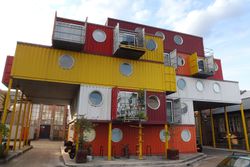
Becoming green is a high priority for urban planners in Leamouth. The environmental and aesthetic benefits to the city is the prime motivation. The planters on a roof garden may be designed for a variety of functions and vary greatly in depth to satisfy aesthetic and recreational purposes. Leamouth is active in green urban development. When surveyed, 90% of Leamouth citizens voted for roof gardens to be implemented in the city's plans. According to Mayor-President Joe Budd, "Roof gardens present possibilities for carrying the notions of nature and open space further in tall building development." Recreational reasons, such as leisure and relaxation, beautifying the environment, and greenery and nature, received the most votes. Planters can hold a range of ornamental plants: anything from trees, shrubs, vines, or an assortment of flowers. As aesthetics and recreation are the priority they may not provide the environmental and energy benefits of a green roof.
In Trinity Buoy ward, Urban Space Holdings used the area to develop "Container City" in 2001, a studio and office complex made from recycled sea shipping containers. The original project was made from 80% recycled material. "Container City 1" took 5 months to complete, taking 4 days to install. The Container City project proved very popular and in 2002 "Container City 2" was completed delivering a further 22 studios across 5 floors in with a brightly coloured ziggurat design. A further extension to the Container City Complex was the "Riverside Building" located next to the Thames facing The O2 dome. This was yet another architectural design providing an additional 22 studio spaces.
Climate
Leamouth has a temperate oceanic climate (Köppen: Cfb ) receiving less precipitation than Rome, Bordeaux, Lisbon, Naples, Sydney or New York City. Temperature extremes in Leamouth range from 38.1 °C (100.6 °F) at Kew during August 2003 down to −21.1 °C (−6.0 °F). However, an unofficial reading of −24 °C (−11 °F) was reported on 3 January 1740. Conversely, the highest unofficial temperature ever known to be recorded in Leamouth occurred in the 1808 heat wave. The temperature was recorded at 105 °F (40.6 °C) on 13 July. It is thought that this temperature, if accurate, is one of the highest temperatures of the millennium in Leamouth. It is thought that only days in 1513 and 1707 could have beaten this. The warmest month on record is July 1868, with a mean temperature of 22.5 °C (72.5 °F) at Greenwich whereas the coldest month is December 2010, with a mean temperature of −6.7 °C (19.9 °F). The highest pressure ever reported is 1,050 millibars (31 inHg) on 20 January 2020 and the lowest is 945.8 millibars (27.93 inHg) on 25 December 1821.
Summers are generally warm, sometimes hot. Leamouth's average July high is 24 °C (74 °F). On average each year, Leamouth experiences 31 days above 25 °C (77.0 °F) and 4.2 days above 30.0 °C (86.0 °F) every year. During the 2003 European heat wave there were 14 consecutive days above 30 °C (86.0 °F) and 2 consecutive days when temperatures reached 38 °C (100 °F), leading to hundreds of heat-related deaths. There was also a previous spell of 15 consecutive days above 32.2 °C (90.0 °F) in 1976 which also caused many heat related deaths. The previous record high was 38 °C (100 °F) in August 1911 at the Greenwich station. Droughts can also, occasionally, be a problem, especially in summer. Most recently in Summer 2018 and with much drier than average conditions prevailing from May to December. However, the most consecutive days without rain was 73 days in the spring of 1893.
Winters are generally cool with little temperature variation. Heavy snow is rare but snow usually happens at least once each winter. Spring and autumn can be pleasant. As a small city surrounding by London, Leamouth has a considerable urban heat island effect, making the centre of Leamouth at times 5 °C (9 °F) warmer.
Although Leamouth and the British Isles have a reputation of frequent rainfall, Leamouth's average of 602 millimetres (23.7 in) of precipitation annually actually makes it drier than the global average. The absence of heavy winter rainfall leads to many climates around the Mediterranean having more annual precipitation than Leamouth.
| Climate data for Leamouth | |||||||||||||
|---|---|---|---|---|---|---|---|---|---|---|---|---|---|
| Month | Jan | Feb | Mar | Apr | May | Jun | Jul | Aug | Sep | Oct | Nov | Dec | Year |
| Record high °C (°F) | 17.2 (63) |
21.2 (70.2) |
24.2 (75.6) |
29.4 (84.9) |
32.8 (91) |
35.6 (96.1) |
37.9 (100.2) |
38.1 (100.6) |
35.4 (95.7) |
29.9 (85.8) |
20.8 (69.4) |
17.4 (63.3) |
38.1 (100.6) |
| Average high °C (°F) | 8.1 (46.6) |
8.4 (47.1) |
11.3 (52.3) |
14.2 (57.6) |
17.9 (64.2) |
21.2 (70.2) |
23.5 (74.3) |
23.2 (73.8) |
20.0 (68) |
15.5 (59.9) |
11.1 (52) |
8.3 (46.9) |
15.23 (59.41) |
| Daily mean °C (°F) | 5.2 (41.4) |
5.3 (41.5) |
7.6 (45.7) |
9.9 (49.8) |
13.3 (55.9) |
16.5 (61.7) |
18.7 (65.7) |
18.5 (65.3) |
15.7 (60.3) |
12.0 (53.6) |
8.0 (46.4) |
5.5 (41.9) |
11.3 (52.3) |
| Average low °C (°F) | 2.3 (36.1) |
2.1 (35.8) |
3.9 (39) |
5.5 (41.9) |
8.7 (47.7) |
11.7 (53.1) |
13.9 (57) |
13.7 (56.7) |
11.4 (52.5) |
8.4 (47.1) |
4.9 (40.8) |
2.7 (36.9) |
7.43 (45.38) |
| Record low °C (°F) | -16.1 (3) |
-18.9 (-2) |
-8.3 (17.1) |
-3.2 (26.2) |
-3.1 (26.4) |
-0.6 (30.9) |
3.9 (39) |
2.1 (35.8) |
1.4 (34.5) |
-5.5 (22.1) |
-7.1 (19.2) |
-14.2 (6.4) |
−18.9 (−2) |
| Average Precipitation mm (inches) | 55.2 (2.173) |
40.9 (1.61) |
41.6 (1.638) |
43.7 (1.72) |
49.4 (1.945) |
45.1 (1.776) |
44.5 (1.752) |
49.5 (1.949) |
49.1 (1.933) |
68.5 (2.697) |
59.0 (2.323) |
55.2 (2.173) |
601.7 (23.689) |
| Average precipitation days (≥ 1.0 mm) | 11.1 | 8.5 | 9.3 | 9.1 | 8.8 | 8.2 | 7.7 | 7.5 | 8.1 | 10.8 | 10.3 | 10.2 | 109.6 |
| Sunshine hours | 61.5 | 77.9 | 114.6 | 168.7 | 198.5 | 204.3 | 212.0 | 204.7 | 149.3 | 116.5 | 72.6 | 52.0 | 1,632.6 |
| Source: Leamouth Weather Observatory | |||||||||||||
Economy
Leamouth's economy is an example of a mixed economy; a welfare state it features a combination of free market activity and large state ownership in certain key sectors, influenced by co-operative governments since the foundation of the city-state. Leamouth is the first sovereign state outside Scandinavia to adopt the Nordic model, which comprises the economic and social policies as well as typical cultural practices common to the Nordic countries. It includes a comprehensive welfare state and multi-level collective bargaining based on the economic foundations of free-market capitalism, with a high percentage of the workforce unionised and a large percentage of the population employed by the public sector. Public health care in Leamouth is free, being paid for from "voluntary taxation" paid by citizens on low income and "mandatory taxation" paid by citizens on high income, and parents have 46 weeks paid parental leave. The government has shown support for a universalist welfare state aimed specifically at enhancing individual autonomy and promoting social mobility; a corporatist system involving a tripartite arrangement where representatives of labour and employers negotiate wages and labour market policy mediated by the government; and a commitment to private ownership (with some caveats).
Complimentary currency

The Leamouth pound (£L) was adopted as a form of complimentary currency scheme which can only be used in Leamothian registered businesses. According to the Secretary for Finance and Economy Michelle Wright, the currency was made to "improve Leamouth's economy and help local businesses on a municipal level". Its primary aim is to support independent traders in order to maintain diversity in business throughout the city. The scheme is a joint not-for-profit enterprise between Leamouth Pound Community Interest Company and Leamouth Bank.
As well as potentially stimulating the economy it can create stronger bonds within communities; by increasing social capital. Buying locally can decrease emissions as locally produced good require less transportation. It is believed that local trade through the use of the Leamouth pound can be a resilience strategy; reducing impact of national economic crises and dependency on international trade, and enhancing self-sufficiency. It can also increase the awareness of the impact of one's economic activity.
Leamouth Pound account holders can convert £Ls to and from pound sterling at a 1:1 ratio. The Government of Leamouth, and other organisations in the city, offer their employees the option to take part of their salaries in Leamouth pounds.
Every paper £L is backed up by a pound sterling deposited at Leamouth Bank. The Leamouth Pound is not Legal tender, nor is it recognised by the United Kingdom or the rest of the international community, and participation is therefore voluntary. The directors of the scheme cannot prevent national and multinational companies accepting paper £Ls, but can decide, based on the Rules of Membership, whether a business is permitted to open a Leamouth Pound account and trade electronically.
Leamouth pounds can only be exchanged back into pounds sterling via an electronic Leamouth Pound account. There is no fee for doing this. Paper Leamouth Pounds cannot be directly exchanged back to sterling unless first deposited into an electronic account. Technically, the notes are vouchers and the first issue of the paper Leamouth Pounds also have an expiry date.
Industry
Since the beginning construction in Leamouth during the 1800s and throughout the existence of the Free City of Leamouth, shipping, fishing, agriculture, trade, and banking have been leading sectors of the Leamothian economy. Industries in Leamouth has played a special role in London's economy for many centuries until the proclamation of the Free City of Leamouth, when most remaining industries in Leamouth began playing a crucial role in the newly established state entity.
Known as Leamouth Wharf, one of it most significant industries was the shipyard and iron works site called Thames Ironworks and Shipbuilding Company, which was based at the mouth of Bow Creek right at its confluence with the River Thames.[6] Little industry remains in Leamouth today. One of the last survivors, the Pura Foods edible oil works, in a loop of Bow Creek at Orchard Place, closed down in 2006. This site had once been occupied by the Thames Plate Glass Works. For many years the sugar firm Fowler's, a significant maker of treacle, was in Leamouth.
Transport

The city-state claims to be the most bike-friendly countries in world. Cycling is an ubiquitous mode of transport in Leamouth. Almost as many kilometres are covered by bicycle as by public transport. Leamothians are estimated to have at least one bicycle per household, which makes more than one per capita, and twice as many motor vehicles on the road. Cycling infrastructure is comprehensive. Busy roads has dedicated cycle tracks, physically segregated from motorised traffic. Busy junctions are often equipped with bicycle-specific traffic lights. There are large bicycle parking facilities scattered across the city. In 2020, the Secretary for Infrastructure, Environment and Urban planning, Khadim Khan, oversaw the creation of the "Go Cycle Leamouth" project to boost the cycling infrastructure and dubbed it "a project of hope to create a cleaner, safer, greener and sustainable city." Within the Leamouth Transport Plan (LTP), the Leamouth City-State Council has proposed the creation of a Bicycle-sharing system managed by the "Go Cycle Leamouth" project.
Public transport within the city is largely bus-based, operated majoritively by London Buses, serving Greater London, England and the neighboring independent city-state of Leamouth. The Leamouth City-State Council has proposed the creation of the Leamouth Bus Service (LSB), a public transport project using electric-powered minibuses to transport passengers throughout the city.
Demographics
This section is empty. You can help by adding to it. (June 2022) |
Education
This section is empty. You can help by adding to it. (June 2022) |
Healthcare
This section is empty. You can help by adding to it. (June 2022) |
Culture
This section is empty. You can help by adding to it. (June 2022) |
See also
References
- ↑ Church of England Website Poplar ecclesiastical parish map
- ↑ A Survey of London 1994, Hermione Hobhouse (Gen. Ed.)
- ↑ The cottages typically consisted of four rooms and a wash-house.
- ↑ Charles Lammin Memories of Orchard House (East London History Society, 1961)
- ↑ https://www.hidden-london.com/gazetteer/leamouth/amp/
- ↑ Survey of London: volumes 43 and 44, Leamouth Wharf edited by Hermione Hobhouse, 1994

